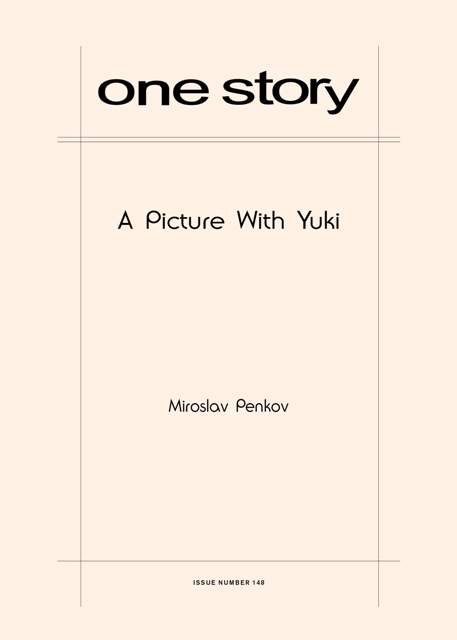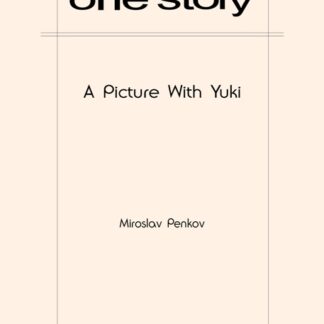
A Picture With Yuki
$2.50
48 in stock
Excerpt
Yuki and I arrived in Bulgaria three weeks before our hospital appointment, mostly so we’d have enough time to get over jet lag, but also so we would get there before the big summer heat, and not buy plane tickets at peak season prices. We spent the first week in Sofia, with my parents, and got along with them surprisingly smoothly, considering the circumstances. But my hometown did not sit well with my wife. When they’d first heard we were coming, my parents had equipped my old room with a new bed and an AC. But the AC had arrived defective, and it would take a month before the new part was delivered. At night Yuki complained of the heat and when I opened the window it was the boulevard that annoyed her, the barking stray dogs, the drunks who had turned the bus stop into their drinking spot.
For a few nights straight Yuki did not sleep. She would sit in bed and press the AC remote repeatedly and the AC would rattle but not cool.
“It’s all nerves,” I told her. I reminded her that just the other day she had smoked her last cigarette outside O’Hare. She reminded me that just the other day her suitcase had not landed with us in Sofia . That when it had finally arrived, her toothbrush had been missing, her blue Starter sneakers, the box of Nicorette gum.
Miroslav Penkov
Miroslav Penkov was born in 1982 in Bulgaria. He arrived in America in 2001 and completed a bachelor’s degree in Psychology and an MFA in Creative Writing at the University of Arkansas . He has won the Eudora Welty Prize in Fiction, and his story “Buying Lenin” was published in The Best American Short Stories 2008, edited by Salman Rushdie. He teaches creative writing at the University of North Texas, where he is a fiction editor for American Literary Review. His debut collection, East of the West, will be published in July by Farrar, Straus and Giroux. You can find him online at www.miroslavpenkov.com.
Q&A by Hannah Tinti
- HT: Where did the idea for this story come from?
- MP: About a year before I wrote “A Picture with Yuki” I stumbled upon a series of 19th century post-mortem photographs online. I’d heard of post-mortem photography before, but had never seen actual photos. Back in the day, only the rich could afford to commission a painter and pose for a portrait. In a poor family, there were rarely any paintings to remember the dead. All this changed with the invention of the daguerreotype; but even then, to save money, people often photographed their loved ones only after death had occurred. To make the deceased appear still alive special contraptions were used for propping up the body. Around it the living gathered for one final keepsake. I knew that I didn’t want to write about such grim things, which meant that, at some point, I would have to. In the spring of 2009 two very close friends of mine, a young couple who were having trouble conceiving, traveled back to Bulgaria for cheaper in vitro. I was thinking about them a lot at the time, wishing them well. That same semester I was teaching Raymond Carver’s “A Small, Good Thing” and comparing it to “The Bath”—the originally published version of the story, edited by Gordon Lish. I wanted to write for my collection a story in tribute to Carver. I hope this doesn’t sound too pompous. To some American friends Carver is like an indie band that made it so big it’s no longer cool to listen to its songs. But coming from Bulgaria, I did not hear of him until I was twenty one, and his stories moved me greatly (and still do). The visit to the bakery at the end of “A Small, Good Thing” has always struck me as necessary, but somewhat forced. I wanted to figure out a way to make such a life-affirming scene rise naturally out of what precedes it. After a Bulgarian funeral there is always a feast, especially in a village where everyone is invited. The mood is somber, but people eat and drink, and the more they eat, the more they drink, the more alive they feel and an illusion is created: death is defeated, or at least kept at bay, if only for a while.
- HT: What was the most challenging aspect of writing this story?
- MP: To write about death without sentimentality is very difficult for me. I’m a melodramatic person, but a writer cannot afford to write with too much sentimentality. While writing this story I had to keep myself constantly in check.
- HT: Why did you decide to bring these two characters together from such different countries, Bulgaria and Japan, and make them fall in love?
- MP: These two cultures really are incredibly different. Opposing forces, you often hear, make for good conflict. But it was my own life and not the desire to maximize conflict that informed my decision. My wife is Japanese, so that is that. But I am not even remotely interested in writing about my own life. So I tried to imagine the opposite of what was true. For instance, my parents adore my wife. So I wanted to image what it would be like if they didn’t and so on...
- HT: “A Picture With Yuki” takes a dramatic turn halfway through with the appearance of the gypsy boy. Did you always know this plot turn was coming when you began the story? And also—why did you make the boy a gypsy?
- MP: Yes, I knew the turn was coming. This turn is the story and I was purposefully writing toward it, writing to earn it. But I didn’t want to rush things. I needed to deepen character, establish setting and mood. I don’t think the first half is slow, but I can see some readers getting impatient with it. This is a risk I was obligated to take. The first half is meant to lull the reader; without this first half I don’t think the story would work the same way. What follows is supposed to be not just a slap on the face, but a punch in the gut. I’m making everything seem so premeditated here, so coolly and mathematically constructed. I mentioned already how sentimental of a person I am. I cannot calculate a story so meticulously while writing it. I am able to take it apart now and rationalize my decisions, but this is happening only after everything’s been written. While I wrote, I had only two things to lead me—my fear and my intuition. And I made the boy a gypsy to some extent for practical reasons. I imagine that it would be more likely for a gypsy family not to own a camera or have photographed their child before. “But wait”, a careful reader might say, “if the gypsies are so poor how come they have a satellite dish in their house?” Now this is a question regarding some Bulgarian Roma which has always puzzled me greatly.
- HT: In your mind, do you think the narrator and Yuki will make it? Will they ever have a child of their own?
- MP: I believe that a writer should treat his characters, among other things, with love, respect and honesty. I treat my characters as if they were close friends. Although, the honesty I speak of sometimes requires cruelty to which I would not subject my close friends. So maybe it’s better to say that, in certain moments when empathy runs especially high, I treat my characters as if they were me. I can be cruel to myself. But most often at the end of a story I bid my characters farewell. I’ve taken the story as far as I can and now beyond the ending in my mind lies only darkness. I’m no longer able to see what will happen next. I’d like to think that the narrator and Yuki will get pregnant; that, despite everything else, they will be healthy and happy together, a healthy and happy family. And yet, a heaviness settles in my stomach if I think too much about what awaits them. To find out, I’ll either have to start writing their story anew or admit that my guess is as good as anyone’s. So I do with this story as I do with most other stories I write: beyond its ending I imagine nothing.
- HT: How does “A Picture With Yuki” fit into the larger themes of your collection, EAST OF THE WEST? (forthcoming with Farrar, Straus & Giroux this summer)
- MP: I wrote all eight stories in EAST OF THE WEST with a collection in mind. I miss Bulgaria a great deal and writing about Bulgaria in some ways makes me feel connected to the things I love. There are so many stories to tell, at least thirteen-hundred years of Bulgarian history to explore. With this collection I’ve only barely scratched the surface (and I’m afraid the scratch can’t even be seen with a naked eye). I turned back, cast a glance at the last few hundred years and I wondered, what could I write about? So there is a story in the book, about the Ottoman times when Bulgaria was under Turkish rule and the Ottomans forcefully recruited Bulgarian boys for their army; janissaries, who were made to deny their families and god. There is a story about Bulgarian rebels who fought for Macedonia’s freedom, about the aftermath of the Balkan Wars. Stories about the 1923 Communist uprising, about the events of 1944 when the Communist Party finally seized control of Bulgaria, about the so-called Process of Rebirth during which the Party forcefully changed the names of all Bulgarian Muslims to what were deemed “proper, Bulgarian” names. There are stories about things I myself witnessed and lived through: the fall of Communism in 1989, the results of this fall, or about the people who leave Bulgaria every year to make their luck abroad. I did not want history to overwhelm the stories, but to inform them. I wanted the stories to be, above all, about people. There is a story in the collection called “Buying Lenin” which shows an old man who, on some level, has had a great life during Communism. I wanted to balance this story with another that showed the other side of the coin (as if there are only two sides to History’s coin). So I decided to include in “A Picture With Yuki” a story I knew from my father, about the Communists taking control of Bulgaria in 1944 and painting the word KULAK on my great-grandfather’s gates (no physical violence was done to my family). In terms of history, this is where “A Picture With Yuki” stands. But above all, this is a story, like the others in the book, about people; a story with which I’ve tried to give meaning (for myself) to such abstract constructs as memory, loss, guilt, identity, family, country...
- HT: What is the best bit of advice about writing you have ever received?
- MP: At some point I was advised, simply, to write. At the time writing was not as obvious of a thing to do as it seems now. I was advised that writing is rewriting, which is also great advice. But I like something that I read in a book by Nikos Kazantzakis, REPORT TO GRECO, his autobiography. This is dangerous advice, which applies to writing, to living, to whatever you want it to apply to. It is an old Cretan saying and it goes like this:
Return where you have failed, leave where you have succeeded.
